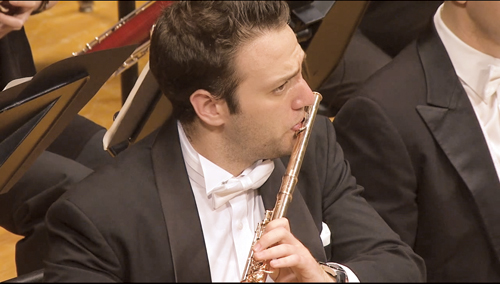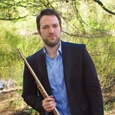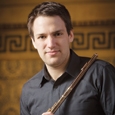
When I played with the St. Louis Symphony last November, I was blown away by the level of commitment each player put in to every phrase. The last concert I played with them was Mahler’s Das Lied Von Der Erde with director David Robertson and soprano Susan Graham. Being on stage with such remarkable musicians illustrated exactly how much commitment it takes to bring a masterpiece of such epic proportions to life. In every performance, the last movement seemed to swell to new heights as players stepped out of the orchestral texture and became as critical as the soloists. I could tell that the performers were not distracted by the exclusive pursuit of perfect technique. They were playing each phrase to make a statement. They were playing like soloists within the fabric of the larger ensemble. Each thread is essential, and each one is beautiful. By the final performance, most of the orchestra was holding back tears at the end of the last movement. It was one of the most powerful things I have experienced. I was not surprised to learn afterward that the audience felt similarly.
Being an orchestra member is a privilege and also an enormous responsibility. Each performer is responsible to the composer, audience, colleagues in the orchestra, and the history of the music that they are playing. Every time I play in orchestra, I try to remind myself of my musical heroes who have played this same music, remembering that they set the standard, and I must rise to meet it. Beyond that, it is up to me to share this music that I love so much with people who may be less familiar with it.
Every time I perform, no matter what the piece, I want it to reflect the absolute best I can play. Many times I have heard colleagues write off pieces because they are considered basic or not serious enough. I think this is a huge mistake. I remember seeing the New Jersey Symphony play Star Wars when I was twelve. This performance made me want to play in an orchestra.
We are also responsible to our audience in ways that go beyond the performance. In this new age of social media, the public is used to easy access to their favorite celebrities and performers. Many musicians seem to think it beneath them to connect with fans and supporters on social media and in person. I think it is extremely important to take time for the people who come to concerts. When a concert is over, I always try to leave through the main exit and talk to anyone who wants to converse with me. I enjoy hearing people’s reactions to the concert, and it inspires me to think that they were affected by what I just created. In a concert hall, it is easy to feel disconnected from those on stage because the audience is far away. Musicians should bridge this gap.
Every single time I perform in orchestra, I am given the chance to improve the world, just a little bit. I have the opportunity to connect with other people. I can only do this by playing music with other musicians, and I can only do it by sharing that music with an audience.
This experience is vital for the larger community because it is vital for me. It can’t be any other way. This is the dynamic that I believe makes orchestral music inherently relevant. When played whole-heartedly by skilled musicians, orchestral music has the ability to profoundly connect performers with each other and with the audience.
My Audition Experience
A Conversation with Jake Fridkis
On April 29, 2015 over 100 flutists auditioned for the principal flute position with the South Dakota Symphony Orchestra. Fridkis was chosen as the winner.
How did you hear of the audition?
I heard about the audition through Gary Schocker, my teacher in high school. He played his concerto, Green Places, with the orchestra previously, and he gave me the heads up that I should apply. He told me it was a great orchestra with nice people. The position also includes a full-time job as a member of the Dakota Wind Quintet which interested me.
How did you prepare for the audition?
I spent two weeks preparing. The list was not too long, and I had played most of the excerpts in orchestra already so I had a good idea of what I wanted to do with them. I spent the two weeks locking everything in.
I spent hours on each excerpt recording myself, bar by bar, to make sure every refinement and idea was audible. I recorded each one in different ways to make sure I liked my final musical decisions. Then I worked on everything I had picked and practiced performing the excerpts. I am a big practicer. I have heard many ideas about not practicing more than three hours a day, but when I am in prep mode, I practice at least six to eight hours every day.
While I was preparing for the audition, I also was working on the Mozart Flute and Harp Concerto for a concert two nights before the audition. The many rehearsals and time spent practicing Mozart helped avoid boredom from just playing excerpts over and over.
I also can’t stress enough the importance of listening. I spent every free second I had listening to recordings of the excerpts. As a young musician who hasn’t had as much experience as others auditioning, I looked for ways to make it sound like I knew the music as well as the seasoned pros. Listening is definitely the quickest way for me to internalize not only the flute part but also what the piece is all about.
Creating my own audition preparation process has been a huge challenge, and I have been guided every step of the way by Mark Sparks. His knowledge of auditions and the mental aspect that goes into preparing for them has been invaluable, so I won’t write his ideas and claim them as my own. However, I also believe that auditioning is personal and what works for me won’t work for everyone. My main advice for preparation would be to find a mentor who has done it before and learn everything you can from him or her. Make sure you understand everything about their advice and don’t be afraid to ask questions about auditions and even life experiences. The more you know going into an audition the more you can let things go and not get stressed by unexpected events of the day. Mark has shared so many of his experiences with me that although I am relatively new to taking auditions, I felt like I had been doing this my whole life.
What was the audition like?
The audition was held in a church and each round was in a different room with drastically different acoustics so it was important to adjust to that quickly. I spent most of my warm up just playing through the excerpts and going over what I had practiced. I don’t really do a warmup ever. I find that if I am practicing enough, I am always warmed up. The audition was in three rounds, and I played in all of them. The semi-final round had 21 flutists, and I picked number 21 so I waited from 10:30 am until 3 pm to play. That could have been stressful, but I took the time to listen to music, go get some coffee, and just relax. I only got my flute out an hour before I was supposed to play.
The audition committee was made up of the principal strings, principal winds, the second flutist, and conductor. I found out that I had won five minutes after they finished talking to us.
Have you taken other auditions?
I had taken a few as an undergrad with mixed results. I took the entire summer after I graduated from the Cleveland Institute of Music studying with Joshua Smith and worked on the excerpts for the Los Angeles Philharmonic’s second flute audition. I made the semi-finals and was really excited. I stopped taking auditions when I started my master’s degree at Yale three years ago. At Yale, I continued working on fundamentals and musicianship with Ransom Wilson, and my teacher from Aspen, Mark Sparks, and developing who I wanted to be as a flutist and more importantly as a musician. Long story short, I returned to my first audition in many years last fall and made the finals for associate principal of the Cincinnati Symphony in September, won the American audition for Symphony SONG (Korea) in February, and then in April I won this one.






